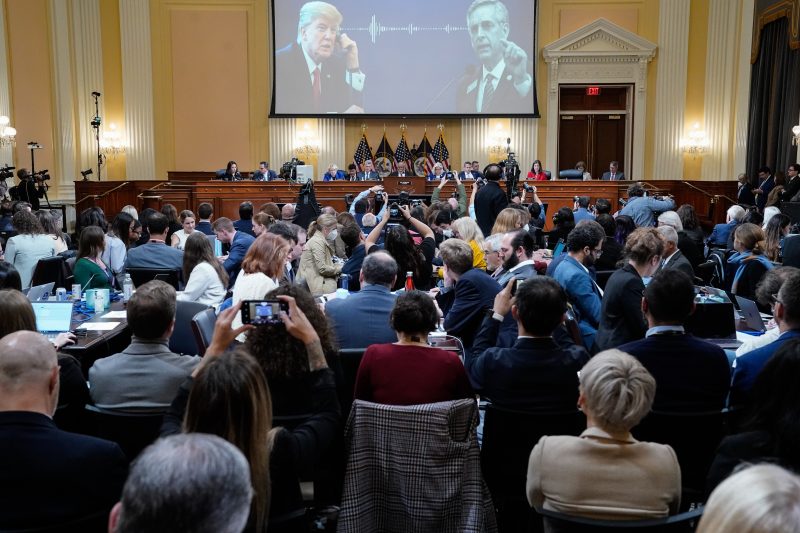The last time America heard from the House select committee investigating the Jan. 6, 2021, riot at the U.S. Capitol, it was for a conclusory hearing summarizing months of work. The hearing built to a — perhaps literally — made-for-television moment: a committee vote subpoenaing former president Donald Trump to offer testimony.
This was in mid-October, a few weeks before a midterm election that both left and right correctly expected to lead to a new Republican House majority in January — a majority that would lead to the committee’s demise almost instantly. The subpoena vote, then, was both a punctuation mark aimed at raising the saliency of the question of Trump’s effort to retain power for midterm voters, and a final bank shot as the clock was ticking down.
That vote is instructive in the moment for a few reasons. First, that was one of a handful of tools the committee actually has at its disposal to try to effect change — one of a handful of tools that depend heavily on systems or timelines outside of the committee’s control for their power. The second reason it was instructive is that it will almost certainly end up not having made much of a difference.
On Monday, the committee will hold its FINAL_final_LastDraft.doc hearing on the riot and Trump’s effort to retain power after his 2020 presidential election loss. It is expected that Trump and potentially several of his allies will be the targets of criminal referrals from the committee — meaning that the committee will send formal recommendations to the Justice Department that those individuals be the subjects of criminal investigation or, potentially, indictment. The referrals could target people like John Eastman, an attorney who advised Trump, or Mark Meadows, Trump’s chief of staff at the time of the riot.
In the abstract, this seems like a big deal: The committee is recommending potential criminal charges! In practice, though, such referrals are often performative, demonstrations of anger at a target against whom there may be no obtainable indictment.
Consider the 2018-2019 period, during which there was a spate of referrals from congressional committees and leaders.
In January 2018, for example, leading Republicans on the Senate Judiciary Committee sent a criminal referral to the DOJ focused on Christopher Steele, the author of the infamous dossier of reports about Trump and Russia. Steele was not charged but Sens. Charles E. Grassley (R-Iowa) and Lindsey O. Graham (R-S.C.) generated a lot of headlines.
In April of that same year, the Justice Department inspector general sent a criminal referral focused on former FBI deputy director Andrew McCabe. This attracted a lot of media attention as well, but, in early 2020, it was determined that no charges would be filed.
In August 2018, W. Samuel Patten, a Trump ally, pleaded guilty to several federal charges, including lying to the Senate Intelligence Committee. It was later revealed that the committee had sent a referral about Patten to the DOJ — but, in a statement following the plea, committee leaders noted that “the charge, and resultant plea, do not appear to directly involve our referral.”
That October, Grassley offered up another referral, this time focused on attorney Michael Avenatti and a client of his who’d made unsubstantiated claims about Supreme Court nominee Brett M. Kavanaugh. Avenatti ended up being sentenced to federal prison — but for an unrelated set of charges focused on theft. Kavanaugh, now a sitting Supreme Court justice, was a target of his own criminal referral back in 2007. It, clearly, didn’t have much of an effect on his career.
In February 2019, Trump attorney Michael Cohen was the focus of a criminal referral alleging that he’d perjured himself in high-profile Capitol Hill testimony. Cohen, too, ended up serving time, but after pleading guilty to financial crimes and campaign-finance violations.
The Cohen referral wasn’t the product of a House committee but, instead, two members of a committee’s Republican minority. One of them was Mark Meadows.
There are others from that period, including a sweeping referral from a bipartisan group focused on testimony offered as part of the Russia investigation, but the pattern should be clear. Even when extracted from partisan politics and political posturing, criminal referrals land in the lap of federal investigators who can do a lot with them or nothing at all.
In the case of the referrals that will probably be offered by the Jan. 6 select committee, there’s another useful consideration: The Justice Department is already investigating Trump for potential criminal violations. Last month, Attorney General Merrick Garland named a special counsel to investigate Trump’s actions related to the 2020 election — the general focus of the House committee — and the former president’s handling of classified documents after leaving office. Garland’s team has been tracking the committee’s work for months, including requesting interview transcripts and other material from House investigators. In other words, there is ample evidence that the Justice Department needs no recommendation from the committee to consider what it has learned; they’ve been doing so all along.
None of this means that such referrals are completely useless or purely performative. The committee’s final report is expected to be a compendium of how Trump tried to retain power, a document useful (and intended) as a political indictment if not leading to a criminal one. The referrals will also probably outline a criminal case that might help build public support and political capital for any future indictment.
Were there no referrals, though, the trajectory of criminal charges stemming from Trump’s effort and the Capitol riot probably wouldn’t be altered much. The committee has done good work elevating the intricacy of the former president’s attempt to derail his electoral loss and has shined a light on the rogue’s gallery that aided him. But, as with the Trump subpoena, its referrals will probably serve more as a rhetorical coda than a new jumping-off point for accountability.
At least if recent history is any indicator.



























